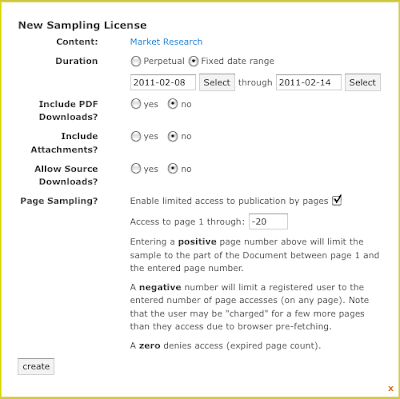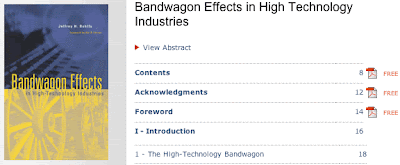Continuing the Sisyphean task of trying to blog as fast as Tizra is upgraded, today's
Feature Frenzy covers the new Sampling License, which as the name suggests, makes it much easier to give away precisely those chunks of content that advance your marketing mission...while keeping the rest behind the paywall or otherwise off limits.
The sampling license is ideal for promotional strategies like...
- Using one content format to promote another — Say you want users to have free access to a web-only version of your content, but to charge them for the convenience of a version they can download, print, or load into their iPad or other ereader. Or maybe you want to charge for video, or other multimedia extras.
- Metered paywall — Gives users free rein to sample whatever parts of your content interest them, but limits the total number of pages they can view. With the Sampling License, you can achieve an effect similar to what publications like the The New York Times are planning (presumably on much more expensive software than Tizra!).
- Pages 1-X free — Similar to the way the Transportation Research Board is giving away the first two pages of each of the thousands of technical papers they're distributing on Tizra, since those just contain summary information that helps promote the content.
 |
| Sampling License controls let users specify page ranges, date ranges, content formats and number or page views to be included in the sample. |
To set up a sampling license, just go to the collection you want to manage in the Tizra control panel. Click "Create Sampling License" and the dialog above pops up. You can then specify a date range and content formats you want it to apply to. If you want to restrict to a certain page range, or number of page views, check the "Page Sampling" box and follow the directions.
Then click "create" and you're done. The terms are immediately applied to all the content within the collection. Much faster than managing your samples one document or document excerpt at a time!
Other Sampling Strategies: Lead Generation
 |
| Generating leads with free content downloads. |
Of course there are other reasons to give content away, some of which are best supported by pre-existing Tizra features. A common one is using content giveaways such as white papers, analyst reports, etc., as an incentive for users who may be interested in your products to submit contact information.
 |
| Setting an Offer to Free. |
You can support this by creating an Offer as you normally would when selling content, but instead of entering a price, selecting the "Free" option. Users will automatically be presented with appropriate registration screens and claim buttons like the one above. You can add whatever fields you want to the registration form by going to USERS > Individual Accounts, then picking an account and clicking "New Property."
Free Excerpts
In many cases, letting prospective buyers leaf through selected parts of a document, like the introduction or foreword, is the best way to help them decide if they want to buy. That's why MIT Press gives away the front matter of books like
Bandwagon Effects in High Technology Industries on their Tizra-hosted CISnet site.
 |
| Excerpt controls let Tizra customers like MIT Press give away specific sections of books (or sell them). |
With our standard Excerpt features, you can specify exactly which pages should be in the samples, and they'll automatically be labeled "FREE" on the table of contents without your having to muck around with web design.
 |
| Creating an Excerpt from a ToC entry. |
To configure free Excerpts, just go to the Properties page for the Document you want to offer samples on, then click the Table of Contents tab. Click "Create Excerpt" on the ToC items as shown above. When you've got all the Excerpts you want, click each and select "yes" next to "Make this Excerpt Free?" Then publish the Excerpt and it'll be open to the world!




Comments